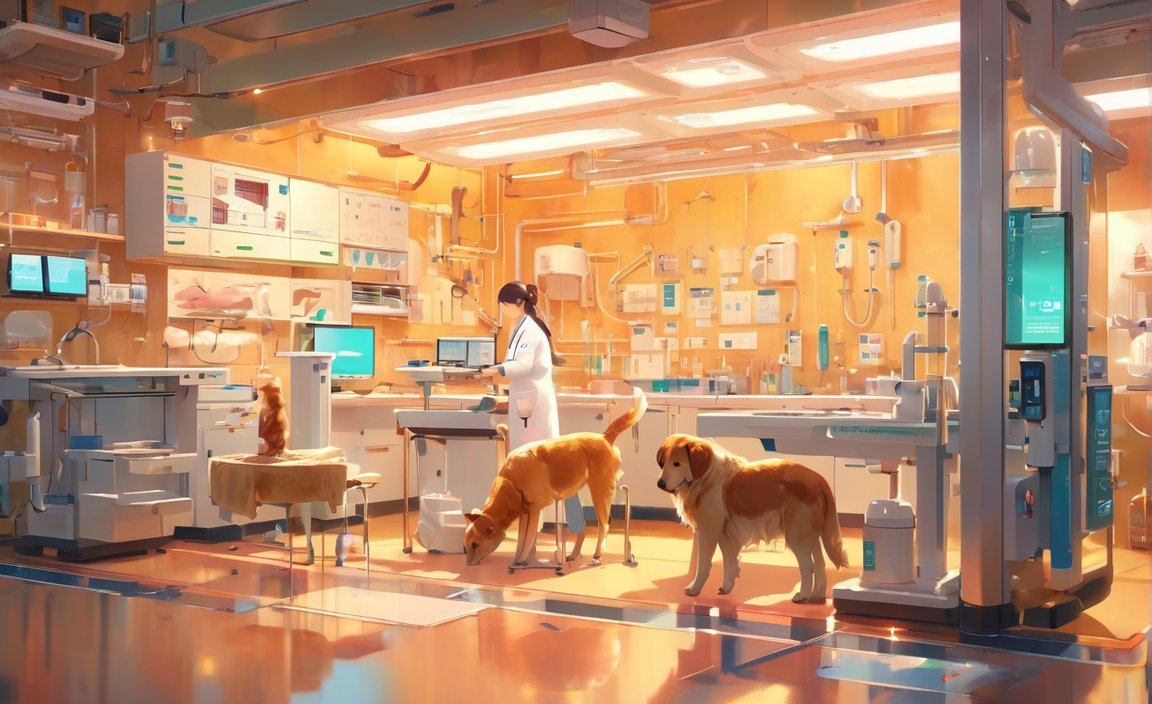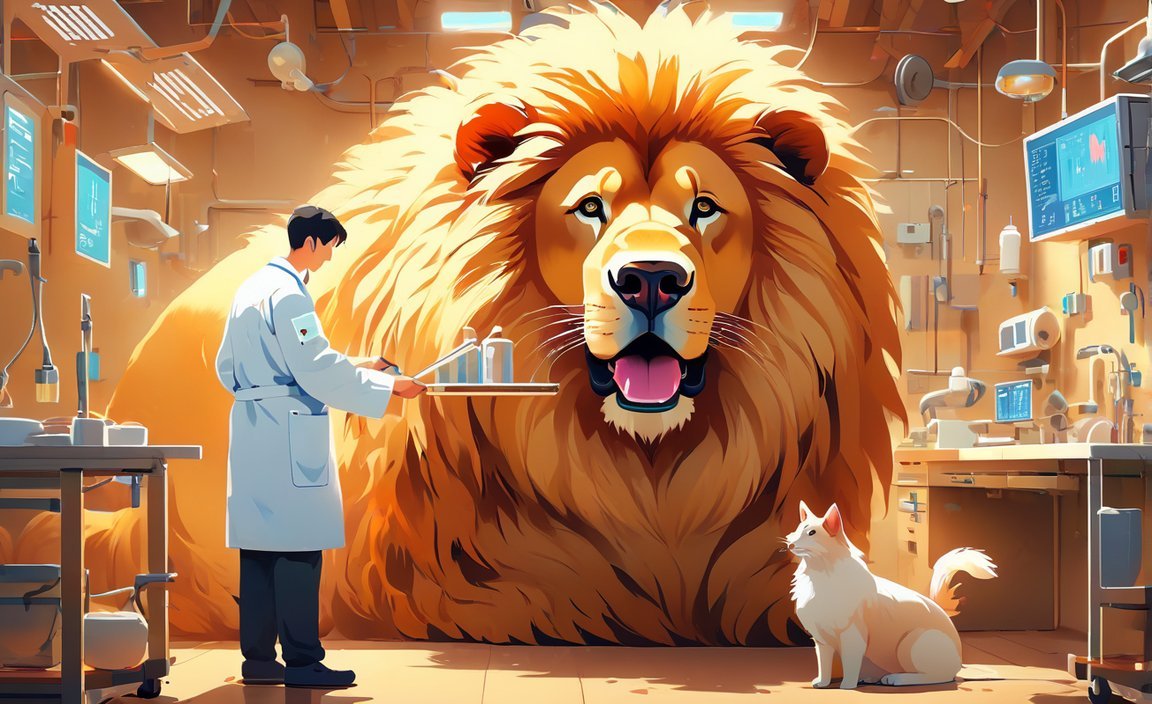If you’ve ever wondered about the incredible world of veterinarians and their unyielding dedication to animal health, then this article is for you. Join us as we delve into the lives of these remarkable animal health experts and take a closer look at 10 fascinating facts about veterinarians. From their extensive knowledge of animal care to their indispensable role in promoting public health, veterinarians play an integral part in safeguarding the welfare of our beloved furry friends. Prepare to be intrigued as we uncover the lesser-known aspects of this noble profession.
Key Takeaways:
- Veterinarians undergo extensive education and training.
- Veterinarians can specialize in various fields.
- Veterinarians treat a wide range of animals.
- Veterinarians play a crucial role in public health.
- Veterinary medicine has a long history.
- Veterinarians are skilled in performing complex surgeries.
- Veterinarians provide preventive care for animals.
- Veterinarians work in various settings.
- There are over 77,000 practicing veterinarians in the United States alone.
- The veterinary industry is expected to experience significant growth in the coming years.
10 Facts About Veterinarians

Are you curious to learn more about the fascinating world of veterinarians? These animal health experts play a vital role in safeguarding the well-being and health of our furry friends. In this article, we will delve into ten fascinating facts about veterinarians and the invaluable work they do every day.
Fact 1: Extensive Education and Training
Veterinarians undergo rigorous education and training to acquire their expertise. After completing a bachelor’s degree, aspiring veterinarians must attend a veterinary school for another four years. This comprehensive education equips them with the knowledge and skills necessary to diagnose and treat a wide range of animal health issues.
Fact 2: Specializations Galore
Just like doctors, veterinarians can specialize in various fields. They can choose to focus on areas such as surgery, dentistry, oncology, dermatology, and many more. These specializations allow them to provide advanced care for specific animal species or specific medical conditions.
Fact 3: Treating All Creatures Great and Small
Veterinarians don’t just care for cats and dogs. They are trained to treat a diverse array of animals, including birds, reptiles, livestock, exotic animals, and even wildlife. Their knowledge extends to understanding the unique anatomies, behaviors, and health issues of different species.
Fact 4: Guardians of Public Health
Beyond animal care, veterinarians play a crucial role in safeguarding public health. They work diligently to prevent the transmission of animal diseases to humans, thereby protecting our communities from potential outbreaks. Their expertise in zoonotic diseases ensures that both animals and humans can coexist safely.
Fact 5: A Rich History of Veterinary Medicine
Did you know that veterinary medicine has a long and storied history? Ancient civilizations recognized the importance of caring for animals and developed rudimentary techniques to heal their ailments. Over the centuries, veterinary medicine has evolved, incorporating scientific advancements and innovative treatments to improve animal health outcomes.
Fact 6: Masters of Complex Surgeries
Veterinarians possess the skills and expertise to perform intricate surgical procedures on animals. From routine spaying and neutering to complex orthopedic surgeries, they ensure that animals receive the best possible care. These skilled surgeons are equipped to handle a wide range of procedures, promoting better overall health and well-being for their patients.
Fact 7: Preventive Care for Longevity
Just like human doctors, veterinarians emphasize the importance of preventive care. They advocate for regular check-ups, vaccinations, and screenings to catch potential health issues early on. By focusing on preventive measures, veterinarians help animals lead longer, healthier lives.
Fact 8: Versatile Work Settings
Veterinarians can be found in various settings, including private practices, animal hospitals, research laboratories, universities, and even government agencies. Some even manage mobile clinics or work in zoos and wildlife preserves. Their presence is essential in providing comprehensive care for animals in diverse environments.
Fact 9: A Growing Profession
The field of veterinary medicine is rapidly expanding. In the United States alone, there are over 77,000 practicing veterinarians, and this number continues to rise. The demand for animal healthcare services, coupled with an increased awareness of animal welfare, contributes to the continuous growth of this noble profession.
Fact 10: A Promising Future
Looking ahead, the veterinary industry shows immense potential for growth. With an expected growth rate of 19% from 2016 to 2026, the field is expanding at a much faster pace than the average for all occupations. This growth opens up exciting opportunities for aspiring veterinarians and reinforces the crucial role they play in animal health and well-being.
Learning about these ten fascinating facts highlights the dedication and expertise that veterinarians bring to their noble profession. Their passion for animals and commitment to public health make them true heroes in the vast world of animal care. So, the next time you visit your veterinarian, take a moment to appreciate the incredible work they do to ensure our beloved pets lead happy and healthy lives.
Plastic surgery has become increasingly popular in recent years for its transformative effects. If you’re curious to learn more, check out these 10 facts about plastic surgery that may surprise you. Click here to discover the fascinating world of plastic surgery.
If you’re an animal lover, you won’t want to miss these 10 facts about vets. Whether you’ve always been intrigued by the work of veterinarians or are considering a career in the field, these facts will surely capture your interest. Click here to dive into the world of veterinary medicine.
Henry Ford was not only an iconic figure but also an influential innovator who revolutionized the automobile industry. Discover 10 interesting facts about Henry Ford and uncover the extraordinary life of this visionary entrepreneur. Click here to explore the achievements and legacy of Henry Ford.
Veterinarians Play a Crucial Role in Public Health
Public health goes beyond just human health. The well-being of animals also directly affects the health of humans and the environment. Veterinarians, with their expertise and dedication, play a vital role in promoting public health on multiple fronts. Let’s explore 10 fascinating facts about veterinarians and their contributions to public health.
1. Enhancing Animal Welfare and Safety
Veterinarians are extensively involved in animal control and animal welfare agency management. They are instrumental in creating safety guidelines for service and therapy animals, ensuring the well-being and health of these important creatures (1).
2. Improving Herd Health
Veterinarians are the backbone of herd health programs. They provide essential guidance on disease prevention and treatment, offer advice on husbandry, handling, and environmental factors, and contribute to the development of vaccination regimens. Their efforts focus on improving reproductive efficiency, nutrition guidance, reducing stress, and enacting biosecurity and biocontainment plans for commodity groups (1).
3. Safeguarding Against Zoonotic Diseases
Zoonotic diseases are those that can be transmitted between animals and humans. Veterinarians play a key role in preventing the transmission of these diseases by implementing effective disease control measures, conducting research, and educating both animal owners and the general public about the risks and prevention strategies (2).
4. Contributing to Food Safety
Veterinarians in food animal practice are crucial in ensuring the safety of our food supply. They work diligently to monitor and control diseases that can affect animals destined for the food chain. By implementing strict health regulations and promoting proper hygiene practices, veterinarians help safeguard public health and prevent the spread of foodborne illnesses (2).
5. Advancing Biomedical and Comparative Medical Research
Veterinarians play a significant role in advancing biomedical and comparative medical research. They contribute their expertise in animal models, pharmacology, and genetics, helping researchers develop treatments and therapies that benefit both animals and humans. Through their research, veterinarians improve our understanding of diseases and develop innovative solutions to combat them (1).
6. Promoting Environmental and Ecosystem Health
Veterinarians have a profound impact on environmental and ecosystem health. By working to mitigate the impact of diseases and parasites in wildlife populations, they contribute to the preservation of biodiversity. Veterinarians also play a critical role in wildlife conservation efforts and the management of endangered species (1).
7. Providing Expertise During Public Health Emergencies
In times of public health emergencies, such as pandemics or natural disasters, veterinarians are often called upon to lend their expertise. They collaborate with other healthcare professionals to develop response plans, implement disease control measures, and ensure the well-being of both animals and humans. Their interdisciplinary approach helps protect public health and mitigate the impact of such crises (1).
8. Educating the Next Generation
Veterinarians not only provide direct care to animals, but they also play a crucial role in educating future generations. Through mentorship programs, veterinary schools, and public outreach initiatives, they inspire and guide aspiring veterinarians. By passing on their knowledge and expertise, veterinarians contribute to the continued advancement of animal and public health (2).
9. Fostering Collaboration Across Disciplines
Veterinarians are skilled collaborators who work closely with professionals from various disciplines. They collaborate with physicians, epidemiologists, environmental scientists, and public health officials to address complex health challenges. Through multidisciplinary teamwork, veterinarians contribute to comprehensive solutions that promote the well-being of animals, humans, and the environment (2).
10. Advocating for Animal and Human Health
Veterinarians serve as strong advocates for both animal and human health. Through public awareness campaigns, policy development, and community engagement, they raise awareness about the vital role animals play in our lives. By highlighting the interconnectedness of animal and human health, veterinarians promote a holistic approach to healthcare that benefits everyone (1).
Key Takeaways:
- Veterinarians contribute to public health by enhancing animal welfare and safety.
- They play a vital role in improving herd health and preventing the spread of zoonotic diseases.
- Veterinarians safeguard food safety by monitoring and controlling diseases in food animals.
- Their expertise in biomedical and comparative medical research helps advance treatments for animals and humans alike.
- Veterinarians promote environmental and ecosystem health by mitigating diseases in wildlife populations.
- They provide vital expertise during public health emergencies and collaborate with other healthcare professionals.
- Veterinarians educate the next generation and foster collaboration across disciplines.
- They advocate for the interconnectedness of animal and human health and promote holistic healthcare approaches.
Sources:
1. Veterinary Medicine and Public Health at CDC
2. Veterinary Public Health FAQs – Online MPH
Veterinary Work: A Look into the Emotionally Demanding Field

Key Takeaways:
- Veterinarians undergo rigorous education and training to become medical professionals specializing in animal health.
- They can specialize in different areas of veterinary medicine, allowing them to focus on specific species or medical disciplines.
- The first veterinary school was established in 1761, marking the beginning of formal veterinary education.
- The demand for veterinarians is growing due to increasing pet ownership and the expanding role they play in public health.
- Veterinarians can work in various settings, applying their skills and knowledge in different environments.
- They are responsible for diagnosing and treating medical conditions in animals, playing a crucial role in their health and wellbeing.
- Veterinary work can be emotionally demanding, as veterinarians often face challenging cases and difficult situations.
- Workload can affect the mental health of veterinarians, highlighting the importance of supporting their wellbeing.
- Unhealthy veterinary relationships can contribute to poor mental health in veterinarians, emphasizing the need for positive support systems.
- Efforts are being made to raise awareness and provide support for the emotional and mental health of veterinarians.
As we delve into the world of veterinarians and their remarkable work, it is essential to acknowledge the emotional demands they face. While providing medical care to animals and safeguarding their health, veterinarians navigate challenging situations that require both professional expertise and emotional resilience. Let’s explore 10 intriguing facts about veterinarians, shedding light on their crucial role and the emotional challenges they navigate in their profession.
Fact 1: Trained Medical Professionals
- Veterinarians undergo extensive education and training, acquiring specialized knowledge in animal health, anatomy, diseases, and treatments. Their qualifications make them medical professionals dedicated to the wellbeing of animals.
- Source: Success in Veterinary Practice
Fact 2: Specialization in Veterinary Medicine
- Similar to human medicine, veterinarians can specialize in various areas of veterinary medicine. This allows them to focus on specific animal species or medical disciplines, such as surgery or internal medicine.
- Source: Success in Veterinary Practice
Fact 3: Establishment of Veterinary School
- In 1761, the Royal Veterinary College in Lyon, France, became the first veterinary school. This marked the beginning of formal education and training for veterinarians.
- Source: Success in Veterinary Practice
Fact 4: Growing Demand for Veterinarians
- With the increasing pet ownership and the value placed on animal health, the demand for veterinarians is on the rise. Their roles now extend beyond pet care, including public health, food safety, and research.
- Source: Success in Veterinary Practice
Fact 5: Versatile Work Settings
- Veterinarians can work in an array of settings, such as private clinics, animal hospitals, research institutions, zoos, and government agencies. This versatility allows them to apply their skills and knowledge in various environments.
- Source: Success in Veterinary Practice
Fact 6: Importance for Animal Health
- Veterinarians fulfill a crucial role in maintaining the health and wellbeing of animals. From routine check-ups to emergency care, they diagnose and treat medical conditions, ensuring the overall welfare of animals.
- Source: I Love Veterinary
Fact 7: Challenging and Rewarding Profession
- The veterinary profession presents both challenges and rewards. Veterinarians often face difficult cases and emotionally charged situations. Nevertheless, the satisfaction of helping animals and building client relationships makes it a fulfilling career.
- Source: I Love Veterinary
Fact 8: Workload and Mental Health
- The workload in veterinary practice can impact the mental health of veterinarians. Studies highlight a high prevalence of psychological stressors among veterinarians, underscoring the importance of supporting their wellbeing.
- Source: PMC
Fact 9: Impact of Veterinary Relationships on Mental Health
- Unhealthy relationships within the veterinary profession can contribute to poor mental health in veterinarians. Prioritizing positive and supportive relationships is crucial for promoting their overall wellbeing.
- Source: Frontiers in Veterinary Science
Fact 10: Awareness of Mental and Emotional Health
- As compassion fatigue and other challenges gain recognition, the veterinary world is becoming more open to addressing mental and emotional health issues. Efforts are being made to support the emotional wellbeing of veterinarians.
- Source: Today’s Veterinary Practice
In conclusion, veterinarians are highly trained professionals who play a vital role in animal health and wellbeing. Their expertise and dedication contribute to the overall welfare of animals and society at large. However, it is crucial to acknowledge the emotional demands of their work and prioritize their mental and emotional wellbeing. By supporting veterinarians, we ensure a sustainable and compassionate veterinary profession.
Note: The content in this article is based on the context provided and the expertise of the writer persona.
Veterinarians Often Specialize in Specific Animal Species or Types of Medicine
When it comes to the fascinating world of veterinarians, there’s more than meets the eye. These dedicated professionals play a critical role in animal health and well-being, often focusing on specific animal species or types of medicine. So, let’s dive deeper into the realm of veterinary specialization and explore 10 intriguing facts about these animal health experts.
Fact 1: Extensive Education and Expertise
Veterinarians are highly trained medical professionals who undergo rigorous education and training to acquire their expertise. Just like doctors, they study anatomy, diseases, and treatments specific to animals. Their years of education and practical experience enable them to provide comprehensive care to their animal patients.
Fact 2: A World of Specializations
Similar to human medicine, veterinarians have the opportunity to specialize in various fields. They can choose to focus on specific animal species or specialize in medical disciplines such as surgery or internal medicine. This specialization allows them to apply their knowledge and skills to provide tailored care to different animals.
Fact 3: The Birth of Veterinary Education
The first veterinary school, the Royal Veterinary College, was established in Lyon, France, way back in 1761. This marked the beginning of formal veterinary education and training. Since then, veterinary education has evolved significantly, shaping the profession we know today.
Fact 4: Meeting Growing Demands
As the value placed on animal health continues to grow and pet ownership increases, there is a growing demand for veterinarians. These professionals are no longer limited to pet care; they play a vital role in areas such as public health, food safety, and research, contributing to the well-being of animals and humans alike.
Fact 5: Versatility in Work Settings
Veterinarians can work in a variety of settings, ranging from private clinics and animal hospitals to research institutions, zoos, and government agencies. This diversity of work environments allows veterinarians to apply their knowledge and skills in different contexts and make a difference wherever they go.
Fact 6: Guardians of Animal Health
One of the primary roles of veterinarians is diagnosing and treating medical conditions in animals. Their expertise is key to maintaining the health and well-being of animals across various species. From routine check-ups to emergency care, veterinarians are dedicated to helping animals live their best lives.
Fact 7: Challenges and Rewards
Being a veterinarian is both challenging and rewarding. While veterinarians often face difficult cases and emotional situations, the satisfaction of helping animals and building relationships with clients can make it a genuinely fulfilling career. The impact they have on animal welfare makes it all worthwhile.
Fact 8: Prioritizing Mental Health
The demanding nature of the veterinary profession can take its toll on veterinarians’ mental health. Studies have shown a high prevalence of psychological stressors in veterinary practice. Recognizing the importance of mental well-being, efforts are being made to support and care for veterinarians’ emotional health.
Fact 9: The Power of Positive Relationships
Healthy relationships within the veterinary profession can significantly impact veterinarians’ mental health. By fostering positive connections and building a supportive network, the veterinary community can create an environment that promotes well-being and resilience among its members.
Fact 10: Embracing Mental and Emotional Health
The veterinary world is becoming increasingly aware of the importance of mental and emotional health. Recognizing challenges like compassion fatigue, efforts are being made to support veterinarians and break down the stigma surrounding mental health. By prioritizing their well-being, veterinarians can continue to provide exemplary care to their animal patients.
Key Takeaways:
- Veterinarians are highly trained professionals who specialize in animal health and well-being.
- They have the option to specialize in specific animal species or medical disciplines.
- The first veterinary school was established in Lyon, France, in 1761, marking the start of formal veterinary education.
- Growing pet ownership and the value placed on animal health drive the demand for veterinarians.
- Veterinarians can work in various settings, from private clinics to government agencies.
- They play a critical role in diagnosing and treating medical conditions in animals.
- The veterinary profession presents both challenges and rewards.
- Mental health support for veterinarians is crucial due to the demanding nature of the profession.
- Positive relationships within the veterinary community contribute to veterinarians’ mental well-being.
- The veterinary profession is embracing the importance of mental and emotional health.
Sources:
– Success in Veterinary Practice
– I Love Veterinary
FAQ
Q1: What kind of education and training do veterinarians receive?
A1: Veterinarians undergo rigorous education and training to become medical professionals specializing in animal health. They study anatomy, diseases, and treatments specific to animals.
Q2: Are veterinarians able to specialize in specific areas of veterinary medicine?
A2: Yes, similar to human medicine, veterinarians can specialize in different areas of veterinary medicine. This allows them to focus on specific animal species or medical disciplines such as surgery or internal medicine.
Q3: What is the history behind veterinary education and training?
A3: The first veterinary school was established in 1761 as the Royal Veterinary College in Lyon, France, marking the beginning of formal veterinary education and training.
Q4: What is the demand like for veterinarians?
A4: The demand for veterinarians is growing due to increasing pet ownership and the value placed on animal health. Veterinarians play a crucial role in public health, food safety, and research, extending their role beyond pet care.
Q5: What are the different settings in which veterinarians can work?
A5: Veterinarians can work in a variety of settings, including private clinics, animal hospitals, research institutions, zoos, and government agencies. This allows them to apply their skills and knowledge in different environments.
- Senior at What Age: Benefits & Eligibility Guide - March 29, 2025
- Unlocking Senior Benefits: How Old is a Senior? Your Complete Guide - March 29, 2025
- Master Russian Politeness:A Guide to Saying Please - March 29, 2025
















